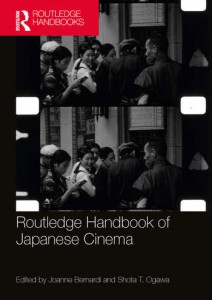Routledge Handbook of Japanese Cinema
Sous la direction de Joanne Bernardi et Shota T. Ogawa


Moyenne des votes : ![]()
| 0 | vote | |
| 0 | vote | |
| 0 | vote | |
| 0 | vote |
Votre vote : -
Description de l'ouvrage:
The Routledge Handbook of Japanese Cinema provides a timely and expansive overview of Japanese cinema today, through cutting-edge scholarship that reflects the hybridity of approaches defining the field.
The volume’s twenty-one chapters represent work by authors with diverse backgrounds and expertise, recasting traditional questions of authorship, genre, and industry in broad conceptual frameworks such as gender, media theory, archive studies, and neoliberalism. The volume is divided into four parts, each representing an emergent area of inquiry:
"Decentring Classical Cinema"
"Questions of Industry"
"Intermedia as an Approach"
"The Object Life of Film"
This is the first anthology of Japanese cinema scholarship to span the temporal framework of 200 years, from the vibrant magic lantern culture of the nineteenth century, through to the formation of the film industry in the twentieth century, and culminating in cinema’s migration to gaming, surveillance video, and other new media platforms of the twenty-first century.
This handbook will prove a useful resource to students and scholars of Japanese studies, film studies, and cultural studies more broadly.
À propos des auteurs :
Joanne Bernardi is Professor of Japanese/Film and Media, University of Rochester. Her background includes East Asian Studies, film preservation, filmmaking, and photography. She directs the Re-Envisioning Japan DH Project; publications include Japanese and silent cinema, film historiography, screenwriting, material culture, tourism, popular culture, and digital humanities.
Shota T. Ogawa is Assistant Professor of Cinema Studies at Nagoya University, Japan. With a background in Visual and Cultural Studies, his research interests include postcolonial hybridity in Japanese cinema, tourism and travel films in imperial Japan, and trans-cultural migration of passing narratives.
Voir le site internet de l'éditeur Routledge
> Des mêmes auteurs :
Provenance and Early Cinema (2021)
de Joanne Bernardi, Paolo Cherchi Usai, Tami Williams et Joshua Yumibe
Sujet : Silent Cinema
Writing in Light (2001)
The Silent Scenario and the Japanese Pure Film Movement
> Sur un thème proche :
Transcendence and Spirituality in Japanese Cinema (2024)
Framing Sacred Spaces
Prostitutes, Hostesses, and Actresses at the Edge of the Japanese Empire (2023)
Fragmenting History
Japanese Filmmakers in the Wake of Fukushima (2023)
Perspectives on Nuclear Disasters
Cinema of Discontent (2023)
Representations of Japan's High-Speed Growth
Making Audiences (2022)
A Social History of Japanese Cinema and Media
Film Viewing in Postwar Japan, 1945-1968 (2022)
An Ethnographic Study